
|
|
SUBSIM: The Web's #1 resource for all submarine & naval simulations since 1997
 |
SUBSIM: The Web's #1 resource for all submarine & naval simulations since 1997 |
 09-05-15, 10:00 PM
09-05-15, 10:00 PM
|
#16 |
|
Silent Hunter
 Join Date: Sep 2010
Posts: 3,975
Downloads: 153
Uploads: 11
|
Ok, about the automatic link from the UZO/periscope to the TDC. I can't give you the source; I read it some time ago and I don't recall details. My memory is that it was more procedure oriented than mechanical/technology oriented. |

|

|
 09-05-15, 10:26 PM
09-05-15, 10:26 PM
|
#17 |
|
Captain
 Join Date: Aug 2009
Posts: 481
Downloads: 74
Uploads: 3
|
That's probably a good point, but it probably would be a simple button. Maybe push and hold to send. That being said, I don't know where that button would be and might have been just s simple toggle on the periscope.
Take a look at this video, particularly the first few clips showing the captain at the periscope and notice where his hands are: In the second clip showing the captain, notice that his right hand is holding something down. I don't have a good source for german operation (hopefully someone does), but could it be that what he's doing there is providing periscope bearings to the tdc? If it's actually as simple as a button to turn sending on and off, I'm pretty well satisfied as to the functionality of the german tdc in this regard in sh3 and 4. Though I think I might like a button press to turn on bearing sending, with it being off the rest of the time.
__________________
My SH4 LP |

|

|
 09-06-15, 10:34 AM
09-06-15, 10:34 AM
|
#18 | |
|
Sea Lord
 |
Quote:
"Between the compound dial and the electric motor was a relay which was controlled by means of a follow-up switch (Blauschalter). If released, the relay interrupted the connection between the dial and the electric motor – the current target bearing from the periscope/UZO did not alter the calculator settings. When the order “Follow-up the target” (Folgen!) was issued, the follow-up switch was triggered and the relay connected the dial with the electric motor, thus the current target bearing was entered into the calculator. This feature made possible updating the target bearing (when the follow-up switch was in the “Folgen!” position), but when it was needed to scan the whole horizon – to not alter the correct calculator settings – the order “do not follow-up target” (Blau! Nicht folgen!) was given and the follow-up switch was released, and the relay disconnected the electric motor from the dial." The circuit diagrams at tvre.org show the "Folgen" switch triggering a relay which engages/ disengages the selsyn motor circuit from the target bearing transmitter at the selected 'scope to the receiver motor in the TVR target bearing calcullator section. When the selsyn circuit is disengaged, target bearing can be entered by hand. When this circuit is engaged, the target bearing input to the TVR is slaved to the target bearing transmitter at the selected 'scope, and follows all horizontal rotation of that 'scope, with resultant continuous calculation of the torpedo firing solution by the TVR and continuous updating of the gyro setting in the selected torpedo. (Continuous updating of the torpedo gyro could also be turned off by a separate switch on the TVR.) Notice that the "Folgen" capability was not a matter of transmitting a single-point target bearing, but of switching between a continuous-update mode and manual entry mode. This is also exactly how the TVR model is implemented in SH3. There is a command "Toggle_TDC_autoupdate" which toggles between automatic continuous updatingof the target bearing from the 'scope/UZO and manual input. According to tvre.org, that is exactly how the Siemens TVR S3 on U-995 operates. So any german submarine fitted with the Siemens T. Vh. Re. S3, the standard KM issue from mid-1941 onward, had the ability to continuously transmit 'scope bearings to the TVR, which would then calculate a firing solution and transmit the calculated gyro angle to the selected torpedo in its tube, all in real time without human intervention. This claim assumes that the analysis of the Siemens S3 hardware presented at tvre.org is correct and that the Siemens TVR onboard U-995 today is an authentic, unmodifed unit. If those two assumptions are correct, then the TVR modeled in SH3 implements this capability exactly as the historical prototype did. Now, it is not fair, or even relevant, to compare the German TVR and the US TDC. The TVR was strictly a torpedo fire director. To the extent that SH3 accurately models the TVR, it appears very intuitive and easy to use. The TDC, in addition to providing a fire control solution, also was an approach aid, through its Position Keeper section. Use of the PK to project target position during a submerged approach, minimizing the need for frequent periscope exposure, was an important element in USN doctrine, and the TDC was used for that purpose in every first-person account I have ever read. The TDC also integrated target data from sonar and radar sensors. The TVR had no comparable capabilities. Is a motorcycle "better" than an SUV? EDIT: Reference to blue indicator lamp for TVR manual update removed. Blue lamp is from a mod, not stock SH3. Last edited by BigWalleye; 09-06-15 at 11:21 AM. |
|

|

|
 09-07-15, 01:02 AM
09-07-15, 01:02 AM
|
#19 |
|
Silent Hunter
 Join Date: Sep 2010
Posts: 3,975
Downloads: 153
Uploads: 11
|
After reading your quotes, and skimming the material on the site, it looks like TVR is substantially better than what I had been led to believe. I don't see any reason to doubt what tvre.org has stated; they go into quite a lot of detail. |

|

|
 09-07-15, 02:55 AM
09-07-15, 02:55 AM
|
#20 | |
|
Captain
 Join Date: Aug 2009
Posts: 481
Downloads: 74
Uploads: 3
|
Quote:
If you (or someone else) can show me good proof of that, I might have an idea of a way to make that work in game. I don't even want to try without knowing for sure though as the temptation to use it anyways would be pretty strong...
__________________
My SH4 LP |
|

|

|
 09-07-15, 05:43 AM
09-07-15, 05:43 AM
|
#21 | |
|
Sea Lord
 |
Quote:
Lest you think that gives the U-boats points for technical excellence, the U-boat periscopes did not have a stadimeter. Range measurement was done with a scope graticle and the Mark 1 human eyeball! That's one Ubi didn't get right. (Source here is also existing U-boat on exhibit.) |
|

|

|
 09-07-15, 07:25 AM
09-07-15, 07:25 AM
|
#22 | |
|
Navy Seal
 |
Quote:
First you set up the TDC for what the AoB will be at time of firing. You're going to be 90º from the track and I have a rule of thumb for anything under 10 knots fire at 10º before your relative zero bearing and for anything 10-15, fire 15º before, higher speed make it 20º. That is a rule of thumb and people say "RR you're not being precise." Well, actually I am, because while I choose the shoot bearing imprecisely, the TDC figures the gyro angle very precisely. No that torpedo won't generally go right up the zero bearing. I will be a few, maybe as many as five degrees off. But according to my experience and the Submarine Torpedo Fire Control Manual, any gyro angle under 20º was considered straight shooting where range mattered very little to a valid solution. Since my error is only 25% of the allowed variance, I hit every shot. So long as you are shooting with position keeper off you can select shoot bearings arbitrarily and still get hits. With position keeper on you can shoot whenever you want so long as your solution remains valid. So I'd say the American TDC is only a disadvantage if you want to try to force it to work like the German TVR. Taken on its own terms it's excellent. And the same is true of the TVR. You can't say it's garbage based on the fact that there are differences from the TDC. After all, none of that matters. The only thing that matters is whether or not a target goes boom. If your device makes the target go boom it is a successful device. But as for your question, with the American TDC you are not selecting the lead angle. You are selecting the shoot bearing and the TDC calculates the correct lead angle, inputs the gyro angle automatically (with manual backup available) to the torpedo and it hits. In my video, I blew the attack and ran my mouth as the target ran past my shoot bearing. Rather than quit and begin again, I just aimed the crosshairs at the bow and stabbed the "send bearing and range to TDC" button, then fired four. All four hit when my AoB was 10º wrong for when I shot. The reason is that the TDC calculated a new gyro angle based on my erroneous input, firing 10º too late, and it was still plenty close enough. I published the video as an example of how error tolerant the Dick O'Kane attack is. That's because of how versatile the TDC is.
__________________
Sub Skipper's Bag of Tricks, Slightly Subnuclear Mk 14 & Cutie, Slightly Subnuclear Deck Gun, EZPlot 2.0, TMOPlot, TMOKeys, SH4CMS Last edited by Rockin Robbins; 09-07-15 at 07:36 AM. |
|

|

|
 09-07-15, 09:10 AM
09-07-15, 09:10 AM
|
#23 | |
|
Navy Seal
 |
Quote:
It's possible that someone with a better working technical vocabulary than I could read the same material and say "You dummy! Right there it is." But my eyes are swimming around aimlessly right now and my brain is overloaded analyzing some pretty deep stuff. So my provisional and falsifiable answer is that it doesn't look like the periscope operator had any controls to automatically send bearing and range to the TDC, whether with a momentary send data switch or with continuous data feed. I'm headed over to the Submarine Fire Control Manual for Attack Procedure and find instructions for one of the two TDC operators: 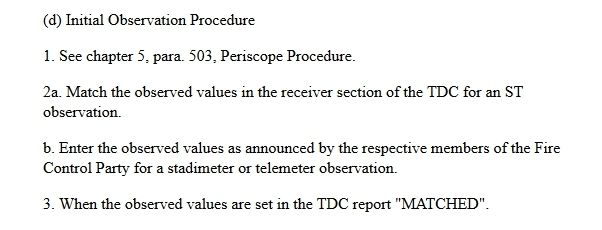 So it looks like he CHECKS to see that the radar values input automatically match the announced data, but he ENTERS "observed values as announced.....for a stadimeter or telemeter observation." I'm going to have to say that unless conflicting evidence is found our game has it right on this one.
__________________
Sub Skipper's Bag of Tricks, Slightly Subnuclear Mk 14 & Cutie, Slightly Subnuclear Deck Gun, EZPlot 2.0, TMOPlot, TMOKeys, SH4CMS Last edited by Rockin Robbins; 09-07-15 at 10:43 AM. |
|

|

|
 09-07-15, 10:40 AM
09-07-15, 10:40 AM
|
#24 | |
|
Swabbie
 Join Date: Jan 2011
Posts: 12
Downloads: 21
Uploads: 0
|
Hi Gentlemen,
Quote:
http://archive.hnsa.org/doc/fleetsub...chap14.htm#14C -- Regards Maciek |
|

|

|
 09-07-15, 10:50 AM
09-07-15, 10:50 AM
|
#25 | |
|
Navy Seal
 |
Quote:
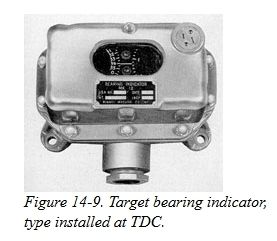
__________________
Sub Skipper's Bag of Tricks, Slightly Subnuclear Mk 14 & Cutie, Slightly Subnuclear Deck Gun, EZPlot 2.0, TMOPlot, TMOKeys, SH4CMS |
|

|

|
 09-07-15, 01:46 PM
09-07-15, 01:46 PM
|
#26 | |
|
Admiral
 |
I thought I'd put in my 2 cents worth.
As far as I know, the input for the TDC was basically a manual one. Verbal "calls" for the various settings coming from the Fire Control Party. It's true the TBT could signal in which direction it was pointed. This signal was not directly linked to the TDC. I don't believe any other inputs were automatically made. Talking about AoB and the authentic aspects of the game....the game's American Stadimeter missed the mark by a wide margin. For the most part the Periscope's Stadimeter Dial provided the bulk of the information needed for the TDC. 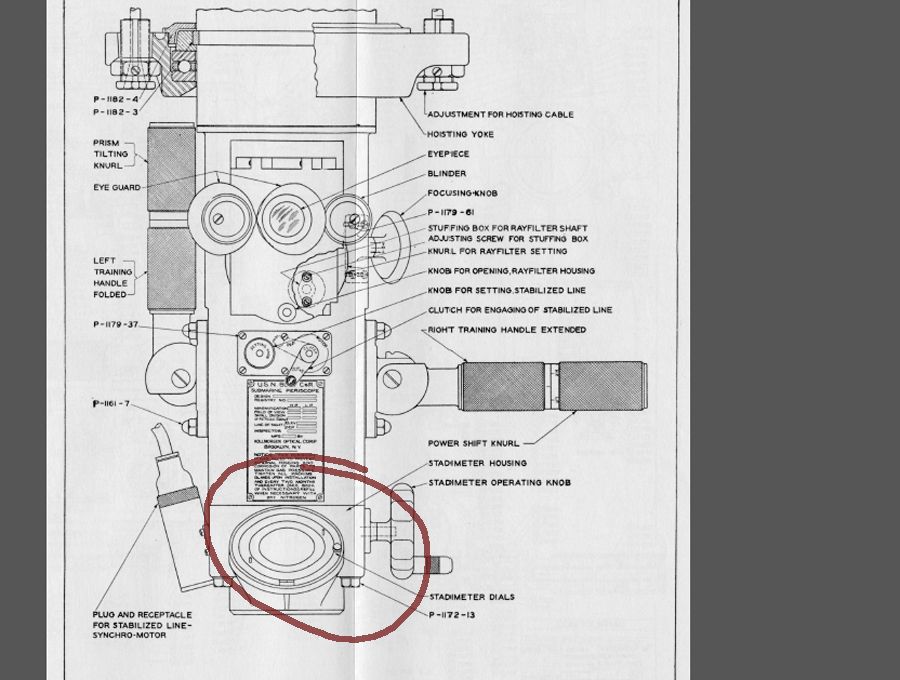 The Stadimeter Housing Unit was fastened onto the bottom of the Periscope. The outside view was brought down through a set of prisms, passing through the Stadimeter len's before going to the eye piece. It had two half len's that slide next to each other, giving the double image. Depending on which axis the sliding edge was pointed to, Up/Down, Left/Right.....the Stadimeter would produce either an estimate of target course angle (AoB), or an estimate of range. Both shown on the Stadimeter Dial. Target Aob and Range could be found within less than a minute by most Captains. Instructions were to have the "Stadimeter Operating Knob" turned in the farthest clockwise position when lowering the periscope. This created the ability to have the two Stadimeter len's first slide on the horizontal axis....giving the AoB of a target, when the Approach Officer first raises the periscope. Then with a further counter clockwise twist of the knob, the axis shifted to the vertical.....giving an estimated range (provided a height/length figure was found in the Recognition Manual, and the Stadimeter Dial was set to the appropriate measurement). This "shift" between the two axis was within a single complete turn of the Operating Knob. 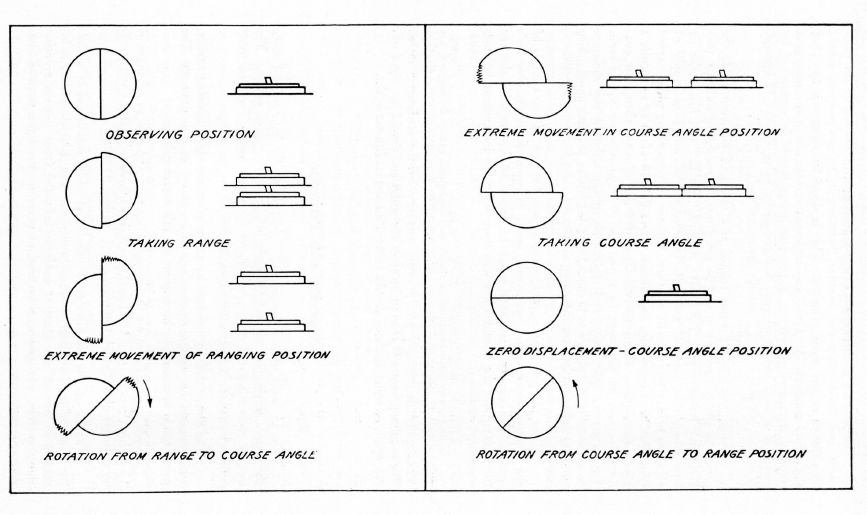 The Stadimeter had two dials, both identical, on either side of the Periscope. It was faster to have a second observer stationed at the opposite dial to make the reading of range or target course, rather than the Captain who kept his focus at the eye piece. The Stadimeter Dial automatically moved the center Dial Ring (one of three Dial Rings of the Stadimeter Dial), when you positioned the double image on the correct reference point. The third outer ring of the Dial was manually set to the "Targets Length". The inner dial ring was stationary, representing the "Targets Height". Although there was no direct link to the TDC, the observer usually called out the found range and target course to have the TDC operator input the information. Unlike the TBT (Target Bearing Transmitter), which did have direct input to the TDC operator for just target bearing. No such direct link was made from the Periscope. In both devices, the game has taken some creative license in simulating their functions and capabilities. In the Stadimeter's case, the game left out an important function for determining AoB from the real life unit. The game only allows the Stadimeter to work vertically, not horizontally. With the TBT, there was no Stadimeter to help in range finding attached to it. Neither were there Telemeter Divisions for judging range. The following image shows what a TBT view looks like, taken at the Submarine Force Library and Museum, Groton Conn. 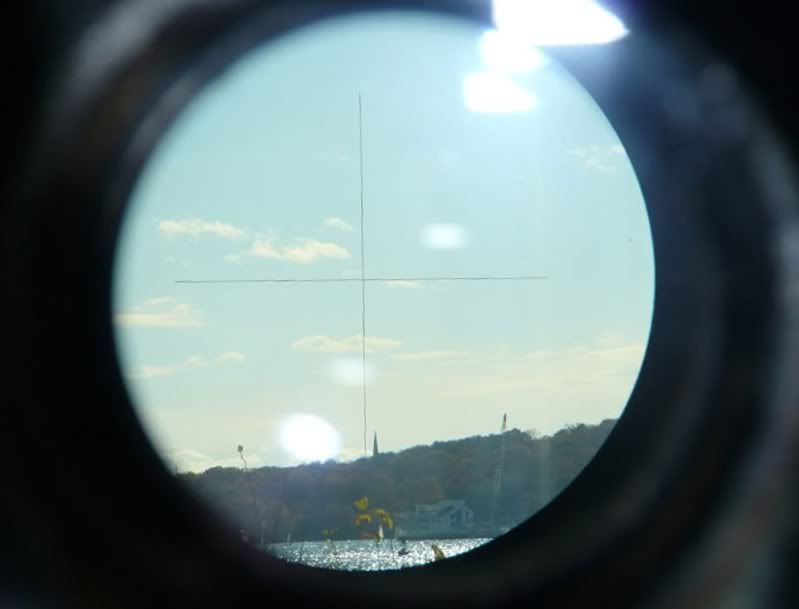 In reality, the TBT's only usefull function was to provide Relative Bearing of a focused target ========= Something else missing in-game. In the above diagram of the periscope, you will see the reference to the knob and clutch (just below the eye piece) for a "Stabilized Line". The Stabilized Azimuth Line provides a "line in space" within the field of view. It was used to determine speed of a target. The line was electrically governed by the subs gyro compass which kept the line at a singular position, irregardless of the subs possible changing position. Once the line was "plugged in" (it was not good to leave it operating for too long because the synchronizing motor could fog up the interior of the scope) the passage of the target over the line was timed with a stop watch, then calculated using the estimated target length to determine target speed. The "clutch" was used to engage the synchronous motor, that was governed by the compass. You had a cord that really was "plugged in" to make it work. As you can see, the Periscope gave you Speed, Range, Target Course (AoB)....all in one easy process. The game missed the actual simulation of this by a large margin. Not only giving us wrong height measurements, wrong scaled viewing, no length measurements (accurate or not), and incomplete simulated features of the devises used in real life.
__________________
 The HMS Shannon vs. USS Chesapeake outside Boston Harbor June 1, 1813 USS Chesapeake Captain James Lawrence lay mortally wounded... Quote:
Last edited by CapnScurvy; 09-07-15 at 09:47 PM. |
|

|

|
 09-07-15, 02:15 PM
09-07-15, 02:15 PM
|
#27 | |
|
Gefallen Engel U-666
|
Quote:
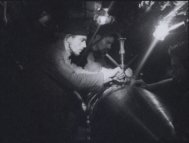 Precisely! Precisely! "The crew programmes the torpedo." "The crew programmes the torpedo."
__________________
"Only two things are infinite; The Universe and human squirrelyness?!! |
|

|

|
 09-07-15, 05:06 PM
09-07-15, 05:06 PM
|
#28 |
|
Sea Lord
 |
Erm, beggin' yer pardon, but yer a bit late to the party. You really should read all the posts on this thread. Then go check out tvre.org/en/ for an eyeopener as to what the Siemens T. Vh. Re. S3 actually was, and still is, capable of doing. That would include getting continuous input from the sub's gyrocompass and the periscope/UZO target bearing transmitter, continuously calculating a firing solution, and automatically (No human intervention!) setting the torpedo gyro angle while the eel is in the tube. The TVR S3 was in service in the KM from mid-1941 on.
Please note that tvre.org represents the results of reverse-engineering the existing Siemens S3 which was installed in U-995 when it was launched in 1943 and can still be seen on board that vessel at the Laboe museum today. Check it out. Better than a movie! Last edited by BigWalleye; 09-07-15 at 05:13 PM. |

|

|
 09-07-15, 08:02 PM
09-07-15, 08:02 PM
|
#29 |
|
Navy Seal
 |
Absolutely, that's one thing the American and German instruments had in common: they automatically set torpedo gyro angles. That doesn't mean that the crew couldn't set them themselves if they had to.
__________________
Sub Skipper's Bag of Tricks, Slightly Subnuclear Mk 14 & Cutie, Slightly Subnuclear Deck Gun, EZPlot 2.0, TMOPlot, TMOKeys, SH4CMS |

|

|
 09-07-15, 08:28 PM
09-07-15, 08:28 PM
|
#30 | ||
|
Silent Hunter
 Join Date: Sep 2010
Posts: 3,975
Downloads: 153
Uploads: 11
|
Quote:
This matches my understanding of the USN's fire control and procedures.From BigWalleye: Quote:
I don't see what you mean here. |
||

|

|
 |
|
|
